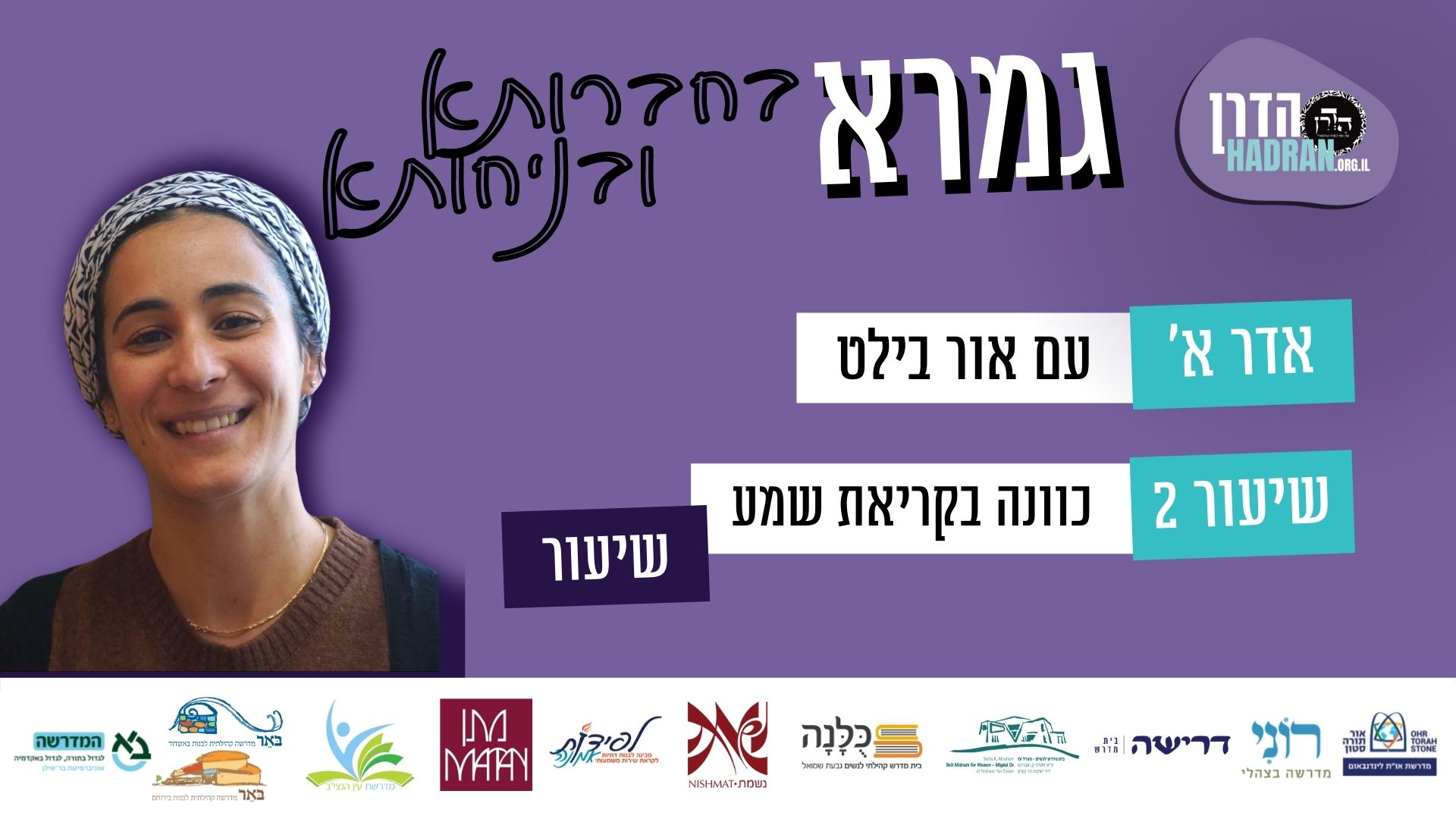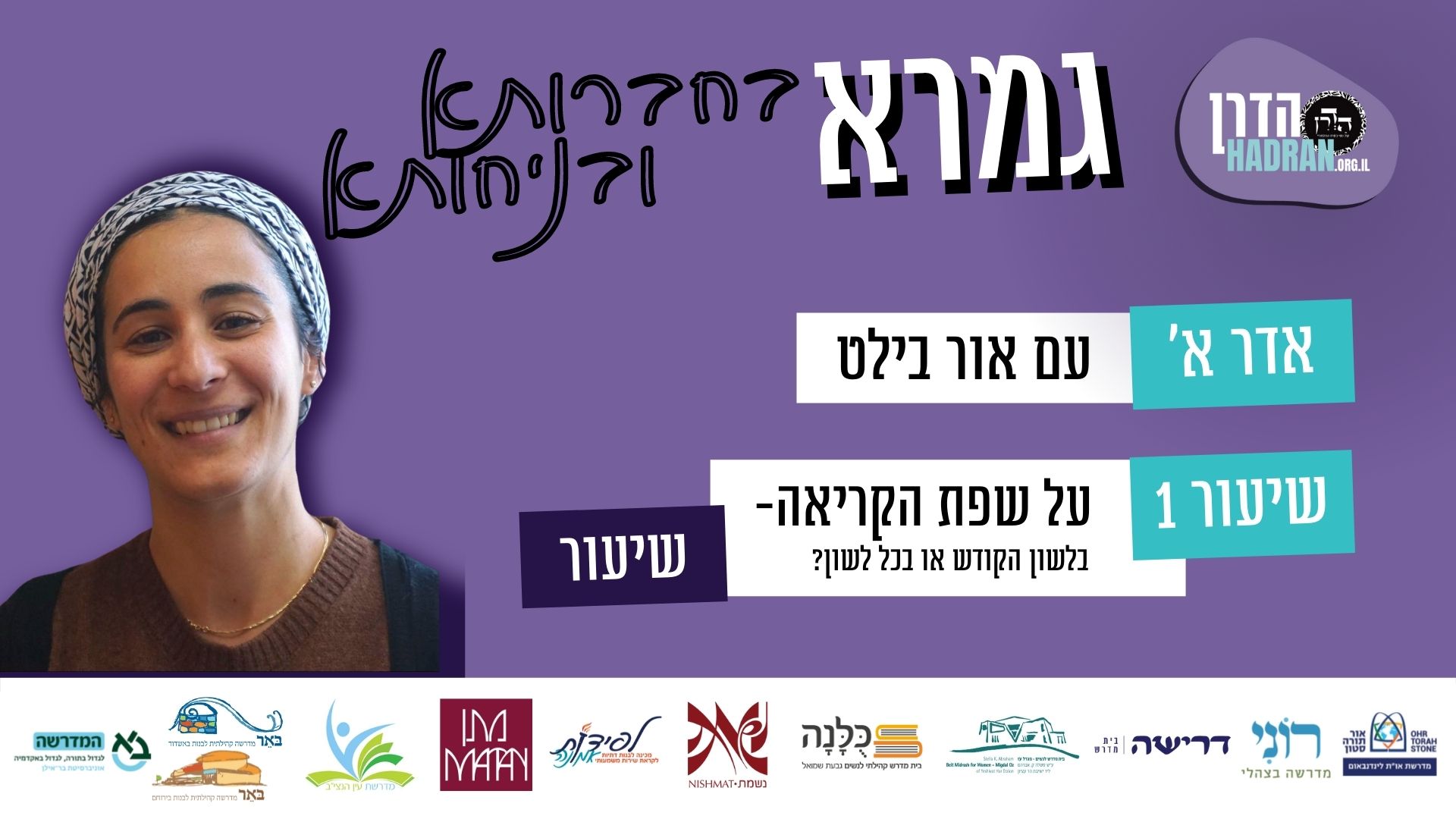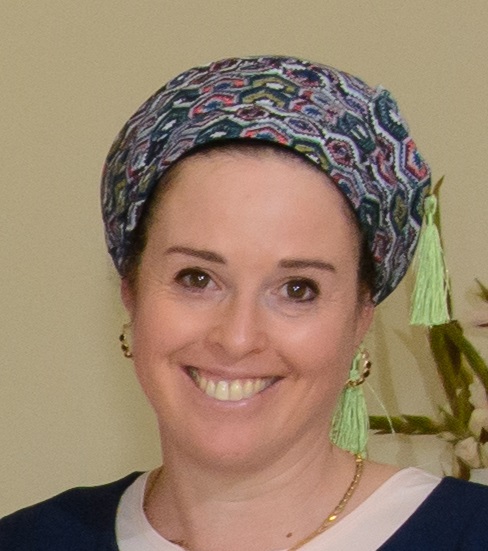ברכות סא
הַכֹּל לְטוֹבָה.
He does for the best.
וְאָמַר רַב הוּנָא אָמַר רַב מִשּׁוּם רַבִּי מֵאִיר: לְעוֹלָם יִהְיוּ דְּבָרָיו שֶׁל אָדָם מוּעָטִין לִפְנֵי הַקָּדוֹשׁ בָּרוּךְ הוּא, שֶׁנֶּאֱמַר: ״אַל תְּבַהֵל עַל פִּיךָ וְלִבְּךָ אַל יְמַהֵר לְהוֹצִיא דָבָר לִפְנֵי הָאֱלֹהִים כִּי הָאֱלֹהִים בַּשָּׁמַיִם וְאַתָּה עַל הָאָרֶץ עַל כֵּן יִהְיוּ דְבָרֶיךָ מְעַטִּים״.
And Rav Huna said that Rav said in the name of Rabbi Meir: One’s words should always be few before the Holy One, Blessed be He, as it is stated: “Be not rash with your mouth and let not your heart be hasty to utter a word before God; for God is in heaven, and you upon earth. Therefore, let your words be few” (Ecclesiastes 5:1).
דָּרַשׁ רַב נַחְמָן בַּר רַב חִסְדָּא: מַאי דִּכְתִיב ״וַיִּיצֶר ה׳ אֱלֹהִים אֶת הָאָדָם״ בִּשְׁנֵי יוֹדִין? — שְׁנֵי יְצָרִים בָּרָא הַקָּדוֹשׁ בָּרוּךְ הוּא, אֶחָד יֵצֶר טוֹב וְאֶחָד יֵצֶר רָע.
Rav Naḥman bar Rav Ḥisda interpreted homiletically: What is the meaning of that which is written: “Then the Lord God formed [vayyitzer] man” (Genesis 2:7), with a double yod? This double yod alludes to that fact that the Holy One, Blessed be He, created two inclinations; one a good inclination and one an evil inclination.
מַתְקִיף לַהּ רַב נַחְמָן בַּר יִצְחָק: אֶלָּא מֵעַתָּה, בְּהֵמָה דְּלָא כְּתִיב בַּהּ ״וַיִּיצֶר״ לֵית לַהּ יִצְרָא? וְהָא קָא חֲזֵינַן דְּמַזְּקָא וְנָשְׁכָא וּבָעֲטָא! אֶלָּא כִּדְרַבִּי שִׁמְעוֹן בֶּן פַּזִּי, דְּאָמַר רַבִּי שִׁמְעוֹן בֶּן פַּזִּי ״אוֹי לִי מִיּוֹצְרִי וְאוֹי לִי מִיִּצְרִי״.
Rav Naḥman bar Yitzḥak strongly objects to this: If that is so, does an animal, with regard to whom vayyitzer is not written with a double yod, not have an inclination? Don’t we see that it causes damage and bites and kicks? Rather, interpret the double yod homiletically, in accordance with the opinion of Rabbi Shimon ben Pazi, as Rabbi Shimon ben Pazi said: This alludes to the difficulty of human life; woe unto me from my Creator [yotzri] and woe unto me from my inclination [yitzri]. If one opts to follow either his Creator or his inclination, woe unto him from the other.
אִי נָמֵי כִּדְרַבִּי יִרְמְיָה בֶּן אֶלְעָזָר. דְּאָמַר רַבִּי יִרְמְיָה בֶּן אֶלְעָזָר: דּוּ פַּרְצוּפִין בָּרָא הַקָּדוֹשׁ בָּרוּךְ הוּא בָּאָדָם הָרִאשׁוֹן, שֶׁנֶּאֱמַר: ״אָחוֹר וָקֶדֶם צַרְתָּנִי״.
Alternatively, this duplication in the language of creation can be explained in accordance with the statement of Rabbi Yirmeya ben Elazar, as Rabbi Yirmeya ben Elazar said: The Holy One, Blessed be He, created two faces [du partzufin] on Adam the first man; he was created both male and female in a single body, as it is stated: “You have formed me [tzartani] behind and before” (Psalms 139:5); tzartani is derived from the word tzura [face]. God formed two faces on a single creation, back and front.
״וַיִּבֶן ה׳ אֱלֹהִים אֶת הַצֵּלָע״.
It is stated: “And the tzela which the Lord, God, had taken from the man, He made a woman, and brought her unto the man” (Genesis 2:22).
רַב וּשְׁמוּאֵל: חַד אָמַר פַּרְצוּף. וְחַד אָמַר זָנָב.
Rav and Shmuel disagree over the meaning of the word tzela: One said: It means face. Eve was originally one face or side of Adam. And one said: It means tail, which he explains to mean that the tzela was an appendage, i.e., one of the ribs in Adam’s chest.
בִּשְׁלָמָא לְמַאן דְּאָמַר פַּרְצוּף — הַיְינוּ דִּכְתִיב ״אָחוֹר וָקֶדֶם צַרְתָּנִי״. אֶלָּא לְמַאן דְּאָמַר זָנָב, מַאי ״אָחוֹר וָקֶדֶם צַרְתָּנִי״? כִּדְרַבִּי אַמֵּי, דְּאָמַר רַבִּי אַמֵּי: ״אָחוֹר״ — לְמַעֲשֵׂה בְרֵאשִׁית, ״וָקֶדֶם״ — לְפוּרְעָנוּת.
The Gemara analyzes this dispute: Granted, according to the one who said that tzela means face; that is why it is written: “You have formed me [tzartani] behind and before.” However, according to the one who said that tzela means tail, what is meant by the verse: “You have formed me [tzartani] behind and before”? The Gemara answers: It can be explained in accordance with the opinion of Rabbi Ami, as Rabbi Ami said: Behind means Adam was created at the end of the act of creation; and before means that he was first for punishment.
בִּשְׁלָמָא ״אָחוֹר״ לְמַעֲשֵׂה בְרֵאשִׁית — דְּלָא אִבְּרִי עַד מַעֲלֵי שַׁבְּתָא, אֶלָּא ״וָקֶדֶם״ לְפוּרְעָנוּת, פּוּרְעָנוּת דְּמַאי? אִילֵּימָא פּוּרְעָנוּת דְּנָחָשׁ, וְהָתַנְיָא רַבִּי אוֹמֵר: בִּגְדוּלָּה מַתְחִילִין מִן הַגָּדוֹל, וּבִקְלָלָה מַתְחִילִין מִן הַקָּטָן.
The Gemara asks: Granted, Adam was behind, or last, in the act of creation, meaning that he was not created until the sixth day, Shabbat eve; however, before, or first, for punishment, to what punishment does this refer? If you say that he was first for punishment in the wake of the episode with the snake, wasn’t it taught in a baraita that, with regard to punishment, Rabbi Yehuda HaNasi says: In conferring honor, one begins with the greatest; in cursing, one begins with the least significant.
בִּגְדוּלָּה מַתְחִילִין מִן הַגָּדוֹל — דִּכְתִיב: ״וַיְדַבֵּר מֹשֶׁה אֶל אַהֲרֹן וְאֶל אֶלְעָזָר וְאֶל אִיתָמָר בָּנָיו הַנּוֹתָרִים קְחוּ וְגוֹ׳״. בִּקְלָלָה מַתְחִילִין מִן הַקָּטָן — בַּתְּחִלָּה נִתְקַלֵּל נָחָשׁ, וּלְבַסּוֹף נִתְקַלְּלָה חַוָּה, וּלְבַסּוֹף נִתְקַלֵּל אָדָם!
The Gemara explains: In conferring honor, one begins with the greatest, as it is written: “And Moses said unto Aaron, and Elazar and Itamar, his remaining sons: Take the meal-offering that remains” (Leviticus 10:12). Aaron, who was the greatest among those involved, is mentioned first. And in cursing, one begins with the least significant, as first the snake was cursed, then Eve was cursed, and ultimately Adam himself was cursed. The punishment did not begin with Adam.
אֶלָּא פּוּרְעָנוּת דְּמַבּוּל, דִּכְתִיב: ״וַיִּמַח אֶת כׇּל הַיְקוּם אֲשֶׁר עַל פְּנֵי הָאֲדָמָה מֵאָדָם וְעַד בְּהֵמָה״, בְּרֵישָׁא אָדָם וַהֲדַר בְּהֵמָה.
Rather, this refers to the punishment of the flood, as it is written: “And He blotted out every living substance which was upon the face of the ground, both man and cattle, creeping things and fowl of the heaven” (Genesis 7:23); the punishment began with man, then the animals, and ultimately all the other creatures.
בִּשְׁלָמָא לְמַאן דְּאָמַר פַּרְצוּף, הַיְינוּ דִּכְתִיב ״וַיִּיצֶר״ בִּשְׁנֵי יוֹדִין. אֶלָּא לְמַאן דְּאָמַר זָנָב, מַאי ״וַיִּיצֶר״?
Returning to interpretation of vayyitzer, the Gemara asks: Granted, according to the one who said that Eve was originally a face or side of Adam; that is why it is written vayyitzer, with a double yod, which allude to the two formations. However, according to the one who said that she was a tail, or appendage, of Adam, what is conveyed by spelling vayyitzer with a double yod?
כִּדְרַבִּי שִׁמְעוֹן בֶּן פַּזִּי, דְּאָמַר רַבִּי שִׁמְעוֹן בֶּן פַּזִּי: ״אוֹי לִי מִיּוֹצְרִי אוֹי לִי מִיִּצְרִי״.
The Gemara responds: This is interpreted homiletically in accordance with the opinion of Rabbi Shimon ben Pazi, as Rabbi Shimon ben Pazi said: This comes to emphasize that which a person says to himself in every circumstance: Woe unto me from my Creator and woe unto me from my inclination.
בִּשְׁלָמָא לְמַאן דְּאָמַר פַּרְצוּף, הַיְינוּ דִּכְתִיב ״זָכָר וּנְקֵבָה בְּרָאָם״, אֶלָּא לְמַאן דְּאָמַר זָנָב, מַאי ״זָכָר וּנְקֵבָה בְּרָאָם״? כִּדְרַבִּי אֲבָהוּ, דְּרַבִּי אֲבָהוּ רָמֵי: כְּתִיב: ״זָכָר וּנְקֵבָה בְּרָאָם״, וּכְתִיב ״כִּי בְּצֶלֶם אֱלֹהִים עָשָׂה אֶת הָאָדָם״! הָא כֵּיצַד? — בַּתְּחִלָּה עָלָה בְּמַחְשָׁבָה לִבְרֹאת שְׁנַיִם, וּלְבַסּוֹף לֹא נִבְרָא אֶלָּא אֶחָד.
Granted, according to the one who said that Eve was a face, that is why it is written: “Male and female, He created them” (Genesis 5:2). However, according to the one who said that Eve was a tail, what is the meaning of the verse: “Male and female, He created them”? The Gemara answers: It can be explained in accordance with the opinion of Rabbi Abbahu. As Rabbi Abbahu raised a contradiction between the verses: On the one hand it is written: “Male and female, He created them,” and on the other hand it is written: “For in the image of God He made man” (Genesis 9:6), indicating that man was created alone. How, then, does he resolve the contradiction? At first, the thought entered God’s mind to create two, and ultimately, only one was actually created.
בִּשְׁלָמָא לְמַאן דְּאָמַר פַּרְצוּף, הַיְינוּ דִּכְתִיב ״וַיִּסְגֹּר בָּשָׂר תַּחְתֶּנָּה״, אֶלָּא לְמַאן דְּאָמַר זָנָב, מַאי ״וַיִּסְגֹּר בָּשָׂר תַּחְתֶּנָּה״? אָמַר רַבִּי יִרְמְיָה, וְאִיתֵּימָא רַב זְבִיד, וְאִיתֵּימָא רַב נַחְמָן בַּר יִצְחָק: לֹא נִצְרְכָה אֶלָּא לִמְקוֹם חֲתָךְ.
The Gemara asks: Granted, according to the one who said that Eve was a face, that is why it is written: “And He took one of his sides and closed up the place with flesh in its place” (Genesis 2:21), as it was necessary to close the side that was open. However, according to the one who said that Eve was originally a tail, what is meant by the verse: “And closed up the place with flesh in its place”? Rabbi Yirmeya said, and some say Rav Zevid said, and some say Rav Naḥman bar Yitzḥak said: It was necessary to say that only with regard to the place of the incision.
בִּשְׁלָמָא לְמַאן דְּאָמַר זָנָב, הַיְינוּ דִּכְתִיב: ״וַיִּבֶן״, אֶלָּא לְמַאן דְּאָמַר פַּרְצוּף, מַאי ״וַיִּבֶן״?
The Gemara challenges the other opinion: Granted, according to the one who said that Eve was a tail, that is why it is written: “And the Lord God built the tzela” (Genesis 2:22); it was a completely new building. However, according to the one who said that Eve was a complete face or side, what is the meaning of: “And He built”? What needed to be built?
לְכִדְרַבִּי שִׁמְעוֹן בֶּן מְנַסְיָא. דְּדָרֵשׁ רַבִּי שִׁמְעוֹן בֶּן מְנַסְיָא: מַאי דִּכְתִיב ״וַיִּבֶן ה׳ אֶת הַצֵּלָע״? מְלַמֵּד שֶׁקִּלְּעָהּ הַקָּדוֹשׁ בָּרוּךְ הוּא לְחַוָּה, וֶהֱבִיאָהּ לְאָדָם הָרִאשׁוֹן — שֶׁכֵּן בִּכְרַכֵּי הַיָּם קוֹרִין לְקַלָּעִיתָא ״בַּנָּיְיתָא״.
The Gemara responds: This must be interpreted homiletically, in accordance with the opinion of Rabbi Shimon ben Menasya, as Rabbi Shimon ben Menasya interpreted homiletically: What is the meaning of that which is written: “And the Lord God built the tzela”? This verse teaches that the Holy One, Blessed be He, braided Eve’s hair, and then brought her to Adam, as in the coastal towns, they call braiding hair, building.
דָּבָר אַחֵר: ״וַיִּבֶן״, אָמַר רַב חִסְדָּא, וְאָמְרִי לַהּ בְּמַתְנִיתָא תָּנָא: מְלַמֵּד שֶׁבְּנָאָהּ הַקָּדוֹשׁ בָּרוּךְ הוּא לְחַוָּה כְּבִנְיַן אוֹצָר, מָה אוֹצָר זֶה קָצָר מִלְּמַעְלָה וְרָחָב מִלְּמַטָּה כְּדֵי לְקַבֵּל אֶת הַפֵּירוֹת, אַף אִשָּׁה קְצָרָה מִלְּמַעְלָה וּרְחָבָה מִלְּמַטָּה כְּדֵי לְקַבֵּל אֶת הַוָּלָד.
Alternatively, the verse: And He built, could be understood as a description of her basic shape, as Rav Ḥisda said, and some say that it is taught in a baraita: This verse teaches that the Holy One, Blessed be He, built Eve like the structure of a storehouse. Just as a storehouse is built narrow on top and wide on the bottom, in order to hold produce without collapsing; so too a woman is created narrow on top and wide on the bottom, in order to hold the fetus.
״וַיְבִיאֶהָ אֶל הָאָדָם״, אָמַר רַבִּי יִרְמְיָה בֶּן אֶלְעָזָר: מְלַמֵּד שֶׁנַּעֲשָׂה הַקָּדוֹשׁ בָּרוּךְ הוּא שׁוֹשְׁבִין לְאָדָם הָרִאשׁוֹן, מִכָּאן לִמְּדָה תּוֹרָה דֶּרֶךְ אֶרֶץ שֶׁיַּחֲזוֹר גָּדוֹל עִם קָטָן בְּשׁוֹשְׁבִינוּת, וְאַל יֵרַע לוֹ.
With regard to the verse: “And brought her unto the man” (Genesis 2:22), Rabbi Yirmeya ben Elazar said: This verse teaches that the Holy One, Blessed be He, was Adam the first man’s best man. From here, the Torah taught that it is a desired mode of behavior for a greater individual to seek out a lesser individual to assist him and serve as his best man. The greater individual should help the lesser and should not feel badly about it, that it might be beneath his dignity.
וּלְמַאן דְּאָמַר ״פַּרְצוּף״, הֵי מִינַּיְיהוּ סַגִּי בְּרֵישָׁא? אָמַר רַב נַחְמָן בַּר יִצְחָק: מִסְתַּבְּרָא דְּגַבְרָא סַגִּי בְּרֵישָׁא. דְּתַנְיָא: לֹא יְהַלֵּךְ אָדָם אֲחוֹרֵי אִשָּׁה בַּדֶּרֶךְ, וַאֲפִילּוּ אִשְׁתּוֹ. נִזְדַּמְּנָה לוֹ עַל הַגֶּשֶׁר — יְסַלְּקֶנָּה לִצְדָדִין. וְכׇל הָעוֹבֵר אֲחוֹרֵי אִשָּׁה בַּנָּהָר — אֵין לוֹ חֵלֶק לְעוֹלָם הַבָּא.
The Gemara asks: And according to the one who said that Eve was a face or side of Adam, which one of them walked in front? Rav Naḥman bar Yitzḥak said: It is reasonable to say that the man walked in front, as it is taught in a baraita: A man should not walk behind a woman on a path, as he will look at her constantly, even if it is his wife. If a woman happens upon him along a bridge, he should walk quickly in order to move her to the sides so that she will not walk in front of him. And anyone who walks behind a woman in a river in order to see her exposed skin when she lifts her clothing as she passes through the water has no portion in the World-to-Come.
תָּנוּ רַבָּנַן: הַמַּרְצֶה מָעוֹת לְאִשָּׁה מִיָּדוֹ לְיָדָהּ כְּדֵי לְהִסְתַּכֵּל בָּהּ, אֲפִילּוּ יֵשׁ בְּיָדוֹ תּוֹרָה וּמַעֲשִׂים טוֹבִים כְּמֹשֶׁה רַבֵּינוּ — לֹא יִנָּקֶה מִדִּינָהּ שֶׁל גֵּיהִנָּם. שֶׁנֶּאֱמַר ״יָד לְיָד לֹא יִנָּקֶה רָּע״ — לֹא יִנָּקֶה מִדִּינָהּ שֶׁל גֵּיהִנָּם.
The Sages taught: One who counts money for a woman from his hand to her hand in order to look upon her, even if he has accumulated Torah and good deeds like Moses our teacher, he will not be absolved from the punishment of Gehenna, as it is stated: “Hand to hand, the evil man shall not go unpunished” (Proverbs 11:21); one who hands money from his hand to her hand, even if he received the Torah from God’s hand to his own, like Moses, he will not be absolved from the punishment of Gehenna, which is called evil.
אָמַר רַב נַחְמָן: מָנוֹחַ עַם הָאָרֶץ הָיָה, דִּכְתִיב: ״וַיֵּלֶךְ מָנוֹחַ אַחֲרֵי אִשְׁתּוֹ״.
Rav Naḥman said: From the following verse we know that Samson’s father, Manoah, was an ignoramus, as it is written: “And Manoah…went after his wife” (Judges 13:11).
מַתְקִיף לַהּ רַב נַחְמָן בַּר יִצְחָק: אֶלָּא מֵעַתָּה, גַּבֵּי אֶלְקָנָה, דִּכְתִיב: ״וַיֵּלֶךְ אֶלְקָנָה אַחֲרֵי אִשְׁתּוֹ״, וְגַבֵּי אֱלִישָׁע, דִּכְתִיב: ״וַיָּקׇם וַיֵּלֶךְ אַחֲרֶיהָ״, הָכִי נָמֵי אַחֲרֶיהָ מַמָּשׁ? אֶלָּא אַחֲרֵי דְבָרֶיהָ וְאַחֲרֵי עֲצָתָהּ, הָכָא נָמֵי אַחֲרֵי דְבָרֶיהָ וְאַחֲרֵי עֲצָתָהּ.
Rav Naḥman bar Yitzḥak strongly objects to this: If that is so that you understand the verse literally, what do you say about the verse with regard to Elkana, the father of the prophet Samuel, as it is written: “And Elkana walked after his wife,” and what of the verse with regard to the prophet Elisha, as it is written: “And he arose and followed her” (II Kings 4:30)? Does this verse mean that he literally walked after her? Rather, certainly this verse means that he followed her words and advice. Here, too, then the verse concerning Manoah may be similarly interpreted; he followed his wife’s words and followed her advice, and did not literally walk behind her.
אָמַר רַב אָשֵׁי: וּלְמַאי דְּקָאָמַר רַב נַחְמָן, מָנוֹחַ עַם הָאָרֶץ הָיָה — אֲפִילּוּ בֵּי רַב נָמֵי לָא קְרָא, שֶׁנֶּאֱמַר: ״וַתָּקׇם רִבְקָה וְנַעֲרֹתֶיהָ וַתִּרְכַּבְנָה עַל הַגְּמַלִּים וַתֵּלַכְנָה אַחֲרֵי הָאִישׁ״ — וְלֹא לִפְנֵי הָאִישׁ.
Rav Ashi said: And according to what Rav Naḥman said, that Manoah was an ignoramus; he did not even learn to read the basic Torah stories that even children learn in school, as it is stated: “Rebecca arose, and her damsels, and they rode upon the camels, and followed the man” (Genesis 24:61); they followed him and did not walk before the man.
אָמַר רַבִּי יוֹחָנָן: אֲחוֹרֵי אֲרִי וְלֹא אֲחוֹרֵי אִשָּׁה, אֲחוֹרֵי אִשָּׁה וְלֹא אֲחוֹרֵי עֲבוֹדָה זָרָה, אֲחוֹרֵי עֲבוֹדָה זָרָה וְלֹא אֲחוֹרֵי בֵּית הַכְּנֶסֶת בְּשָׁעָה שֶׁהַצִּבּוּר מִתְפַּלְּלִין.
On this topic, Rabbi Yoḥanan said: It is preferable to walk behind a lion and not behind a woman, and preferable to walk behind a woman and not behind idolatry, for then it will appear as if he is accompanying the idolatry. It is preferable to walk behind idolatry and not behind a synagogue when the congregation is praying, as he appears to separate himself from the community in that he does not wish to join them in prayer.
וְלָא אֲמַרַן אֶלָּא דְּלָא דָּרֵי מִידֵּי, וְאִי דָּרֵי מִידֵּי — לֵית לַן בַּהּ. וְלָא אֲמַרַן אֶלָּא דְּלֵיכָּא פִּתְחָא אַחֲרִינָא, וְאִי אִיכָּא פִּתְחָא אַחֲרִינָא — לֵית לַן בַּהּ. וְלָא אֲמַרַן אֶלָּא דְּלָא רְכִיב חֲמָרָא, אֲבָל רְכִיב חֲמָרָא — לֵית לַן בַּהּ. וְלָא אֲמַרַן אֶלָּא דְּלָא מַנַּח תְּפִילִּין, אֲבָל מַנַּח תְּפִילִּין — לֵית לַן בַּהּ.
This last halakha has numerous caveats: And we only said this in a case where he is not carrying something, and if he is carrying something, this does not apply, as everyone will understand why he did not enter the synagogue. And we only said this in a case where there is no other entrance to the synagogue, and if there is another entrance, this does not apply. And we only said this in a case where he is not riding a donkey, and if he is riding a donkey, this does not apply. And we only said this in a case where he is not donning phylacteries, but if he is donning phylacteries, this does not apply.
אָמַר רַב: יֵצֶר הָרָע דּוֹמֶה לִזְבוּב וְיוֹשֵׁב בֵּין שְׁנֵי מִפְתְּחֵי הַלֵּב, שֶׁנֶּאֱמַר: ״זְבוּבֵי מָוֶת יַבְאִישׁ יַבִּיעַ שֶׁמֶן רוֹקֵחַ״. וּשְׁמוּאֵל אָמַר: כְּמִין חִטָּה הוּא דּוֹמֶה, שֶׁנֶּאֱמַר: ״לַפֶּתַח חַטָּאת רוֹבֵץ״.
Rav said: The evil inclination is like a fly and it sits between the two entrances of the heart, as it is stated: “Dead flies make the ointment of the perfumer fetid and putrid” (Ecclesiastes 10:1). And Shmuel said: The evil inclination is like a type of wheat, as it is stated: “Transgression [ḥatat] couches at the door” (Genesis 4:7); ḥatat is interpreted homiletically as related to ḥitta, wheat.
תָּנוּ רַבָּנַן: שְׁתֵּי כְּלָיוֹת יֵשׁ בּוֹ בְּאָדָם, אַחַת יוֹעַצְתּוֹ לְטוֹבָה וְאַחַת יוֹעַצְתּוֹ לְרָעָה. וּמִסְתַּבְּרָא דְּטוֹבָה לִימִינוֹ וְרָעָה לִשְׂמֹאלוֹ, דִּכְתִיב: ״לֵב חָכָם לִימִינוֹ וְלֵב כְּסִיל לִשְׂמֹאלוֹ״.
The Sages taught in a baraita: A person has two kidneys; one advises him to do good and one advises him to do evil. And it stands to reason that the one advising him to do good is to his right and the one that advises him to do evil is to his left, as it is written: “A wise man’s understanding is at his right hand, but a fool’s understanding is at his left” (Ecclesiastes 10:2).
תָּנוּ רַבָּנַן: כְּלָיוֹת יוֹעֲצוֹת, לֵב מֵבִין, לָשׁוֹן מְחַתֵּךְ, פֶּה גּוֹמֵר, וֶשֶׁט מַכְנִיס וּמוֹצִיא כׇּל מִינֵי מַאֲכָל, קָנֶה מוֹצִיא קוֹל,
Tangential to the subject of kidneys, the Gemara cites that which the Sages taught in a baraita with regard to the roles of various organs: The kidneys advise, the heart understands, the tongue shapes the sounds that emerge from the mouth, the mouth completes the shaping of the voice, the esophagus takes in and lets out all kinds of food, the trachea produces the voice,
רֵיאָה שׁוֹאֶבֶת כׇּל מִינֵי מַשְׁקִין, כָּבֵד כּוֹעֵס, מָרָה זוֹרֶקֶת בּוֹ טִפָּה וּמְנִיחָתוֹ, טְחוֹל שׂוֹחֵק, קֻרְקְבָן טוֹחֵן, קֵיבָה יְשֵׁנָה, אַף נֵעוֹר. נֵעוֹר הַיָּשֵׁן יָשֵׁן הַנֵּעוֹר — נִמּוֹק וְהוֹלֵךְ לוֹ. תָּנָא: אִם שְׁנֵיהֶם יְשֵׁנִים אוֹ שְׁנֵיהֶם נֵעוֹרִים — מִיָּד מֵת.
and the lungs draw all kinds of liquids, the liver becomes angry, the gall bladder injects a drop of gall into the liver and allays anger, the spleen laughs, the maw grinds the food, and the stomach brings sleep, and the nose awakens. If they reversed roles such that the organ which brings on sleep were to awaken, or the organ which awakens were to bring on sleep, the individual would gradually deteriorate. It was taught: If both bring on sleep or both awaken, the person immediately dies.
תַּנְיָא רַבִּי יוֹסֵי הַגְּלִילִי אוֹמֵר: צַדִּיקִים יֵצֶר טוֹב שׁוֹפְטָן, שֶׁנֶּאֱמַר: ״וְלִבִּי חָלַל בְּקִרְבִּי״. רְשָׁעִים יֵצֶר רַע שׁוֹפְטָן, שֶׁנֶּאֱמַר: ״נְאֻם פֶּשַׁע לָרָשָׁע בְּקֶרֶב לִבִּי אֵין פַּחַד אֱלֹהִים לְנֶגֶד עֵינָיו״. בֵּינוֹנִים — זֶה וָזֶה שׁוֹפְטָן, שֶׁנֶּאֱמַר: ״יַעֲמֹד לִימִין אֶבְיוֹן לְהוֹשִׁיעַ מִשֹּׁפְטֵי נַפְשׁוֹ״.
With regard to one’s inclinations, it was taught in a baraita that Rabbi Yosei HaGelili says: The good inclination rules the righteous, as it is stated: “And my heart is dead within me” (Psalms 109:22); the evil inclination has been completely banished from his heart. The evil inclination rules the wicked, as it is stated: “Transgression speaks to the wicked, there is no fear of God before his eyes” (Psalms 36:2). Middling people are ruled by both the good and evil inclinations, as it is stated: “Because He stands at the right hand of the needy, to save him from them that rule his soul” (Psalms 109:31).
אָמַר רַבָּה: כְּגוֹן אָנוּ בֵּינוֹנִים. אָמַר לֵיהּ אַבָּיֵי: לָא שָׁבֵיק מָר חַיֵּי לְכׇל בְּרִיָּה?
Rabba said: People like us are middling. Abaye, his student and nephew, said to him: If the Master claims that he is merely middling, he does not leave room for any creature to live. If a person like you is middling, what of the rest of us?
וְאָמַר רָבָא: לָא אִיבְּרִי עָלְמָא אֶלָּא לְרַשִּׁיעֵי גְּמוּרֵי אוֹ לְצַדִּיקֵי גְּמוּרֵי. אָמַר רָבָא: לִידַּע אִינָשׁ בְּנַפְשֵׁיהּ אִם צַדִּיק גָּמוּר הוּא אִם לָאו. אָמַר רַב: לָא אִיבְּרִי עָלְמָא אֶלָּא לְאַחְאָב בֶּן עָמְרִי וּלְרַבִּי חֲנִינָא בֶּן דּוֹסָא. לְאַחְאָב בֶּן עָמְרִי — הָעוֹלָם הַזֶּה, וּלְרַבִּי חֲנִינָא בֶּן דּוֹסָא — הָעוֹלָם הַבָּא.
And Rava said: The world was created only for the sake of the full-fledged wicked or the full-fledged righteous; others do not live complete lives in either world. Rava said: One should know of himself whether or not he is completely righteous, as if he is not completely righteous, he knows that his life will be a life of suffering. Rav said: The world was created only for the wicked Ahab ben Omri and for Rabbi Ḥanina ben Dosa. The Gemara explains: For Ahab ben Omri, this world was created, as he has no place in the World-to-Come, and for Rabbi Ḥanina ben Dosa, the World-to-Come was created.
״וְאָהַבְתָּ אֵת ה׳ אֱלֹהֶיךָ״. תַּנְיָא, רַבִּי אֱלִיעֶזֶר אוֹמֵר: אִם נֶאֱמַר ״בְּכָל נַפְשְׁךָ״, לָמָּה נֶאֱמַר ״בְּכָל מְאֹדֶךָ״?, וְאִם נֶאֱמַר ״בְּכָל מְאֹדֶךָ״, לָמָּה נֶאֱמַר ״בְּכָל נַפְשְׁךָ״? אֶלָּא אִם יֵשׁ לְךָ אָדָם שֶׁגּוּפוֹ חָבִיב עָלָיו מִמָּמוֹנוֹ — לְכָךְ נֶאֱמַר ״בְּכָל נַפְשְׁךָ״. וְאִם יֵשׁ לָךְ אָדָם שֶׁמָּמוֹנוֹ חָבִיב עָלָיו מִגּוּפוֹ — לְכָךְ נֶאֱמַר ״בְּכָל מְאֹדֶךָ״. רַבִּי עֲקִיבָא אוֹמֵר: ״בְּכָל נַפְשְׁךָ״ אֲפִילּוּ נוֹטֵל אֶת נַפְשְׁךָ.
We learned in our mishna the explanation of the verse: “And you shall love the Lord your God with all your heart and all your soul and all your might” (Deuteronomy 6:5). This was elaborated upon when it was taught in a baraita: Rabbi Eliezer says: If it is stated: “With all your soul,” why does it state: “With all your might”? Conversely, if it stated: “With all your might,” why does it state: “With all your soul”? Rather, this means that if one’s body is dearer to him than his property, therefore it is stated: “With all your soul”; one must give his soul in sanctification of God. And if one’s money is dearer to him than his body, therefore it is stated: “With all your might”; with all your assets. Rabbi Akiva says: “With all your soul” means: Even if God takes your soul.
תָּנוּ רַבָּנַן: פַּעַם אַחַת גָּזְרָה מַלְכוּת הָרְשָׁעָה שֶׁלֹּא יַעַסְקוּ יִשְׂרָאֵל בַּתּוֹרָה. בָּא פַּפּוּס בֶּן יְהוּדָה וּמְצָאוֹ לְרַבִּי עֲקִיבָא שֶׁהָיָה מַקְהִיל קְהִלּוֹת בָּרַבִּים וְעוֹסֵק בַּתּוֹרָה. אָמַר לוֹ: עֲקִיבָא אִי אַתָּה מִתְיָרֵא מִפְּנֵי מַלְכוּת?
The Gemara relates at length how Rabbi Akiva fulfilled these directives. The Sages taught: One time, after the bar Kokheva rebellion, the evil empire of Rome decreed that Israel may not engage in the study and practice of Torah. Pappos ben Yehuda came and found Rabbi Akiva, who was convening assemblies in public and engaging in Torah study. Pappos said to him: Akiva, are you not afraid of the empire?
אָמַר לוֹ: אֶמְשׁוֹל לְךָ מָשָׁל, לְמָה הַדָּבָר דּוֹמֶה — לְשׁוּעָל שֶׁהָיָה מְהַלֵּךְ עַל גַּב הַנָּהָר, וְרָאָה דָּגִים שֶׁהָיוּ מִתְקַבְּצִים מִמָּקוֹם לְמָקוֹם. אָמַר לָהֶם: מִפְּנֵי מָה אַתֶּם בּוֹרְחִים? אָמְרוּ לוֹ: מִפְּנֵי רְשָׁתוֹת שֶׁמְּבִיאִין עָלֵינוּ בְּנֵי אָדָם. אָמַר לָהֶם: רְצוֹנְכֶם שֶׁתַּעֲלוּ לַיַּבָּשָׁה, וְנָדוּר אֲנִי וְאַתֶּם, כְּשֵׁם שֶׁדָּרוּ אֲבוֹתַי עִם אֲבוֹתֵיכֶם? אָמְרוּ לוֹ: אַתָּה הוּא שֶׁאוֹמְרִים עָלֶיךָ פִּקֵּחַ שֶׁבַּחַיּוֹת?! לֹא פִּקֵּחַ אַתָּה, אֶלָּא טִפֵּשׁ אַתָּה! וּמָה בִּמְקוֹם חִיּוּתֵנוּ, אָנוּ מִתְיָרְאִין, בִּמְקוֹם מִיתָתֵנוּ — עַל אַחַת כַּמָּה וְכַמָּה. אַף אֲנַחְנוּ עַכְשָׁיו שֶׁאָנוּ יוֹשְׁבִים וְעוֹסְקִים בַּתּוֹרָה, שֶׁכָּתוּב בָּהּ: ״כִּי הוּא חַיֶּיךָ וְאֹרֶךְ יָמֶיךָ״, כָּךְ, אִם אָנוּ הוֹלְכִים וּמְבַטְּלִים מִמֶּנָּה — עַל אַחַת כַּמָּה וְכַמָּה!
Rabbi Akiva answered him: I will relate a parable. To what can this be compared? It is like a fox walking along a riverbank when he sees fish gathering and fleeing from place to place.
The fox said to them: From what are you fleeing?
They said to him: We are fleeing from the nets that people cast upon us.
He said to them: Do you wish to come up onto dry land, and we will reside together just as my ancestors resided with your ancestors?
The fish said to him: You are the one of whom they say, he is the cleverest of animals? You are not clever; you are a fool. If we are afraid in the water, our natural habitat which gives us life, then in a habitat that causes our death, all the more so.
The moral is: So too, we Jews, now that we sit and engage in Torah study, about which it is written: “For that is your life, and the length of your days” (Deuteronomy 30:20), we fear the empire to this extent; if we proceed to sit idle from its study, as its abandonment is the habitat that causes our death, all the more so will we fear the empire.
אָמְרוּ: לֹא הָיוּ יָמִים מוּעָטִים, עַד שֶׁתְּפָסוּהוּ לְרַבִּי עֲקִיבָא וַחֲבָשׁוּהוּ בְּבֵית הָאֲסוּרִים, וְתָפְסוּ לְפַפּוּס בֶּן יְהוּדָה וַחֲבָשׁוּהוּ אֶצְלוֹ. אָמַר לוֹ: פַּפּוּס, מִי הֲבִיאֲךָ לְכָאן? אָמַר לוֹ: אַשְׁרֶיךָ רַבִּי עֲקִיבָא שֶׁנִּתְפַּסְתָּ עַל דִּבְרֵי תוֹרָה. אוֹי לוֹ לְפַפּוּס שֶׁנִּתְפַּס עַל דְּבָרִים בְּטֵלִים.
The Sages said: Not a few days passed until they seized Rabbi Akiva and incarcerated him in prison, and seized Pappos ben Yehuda and incarcerated him alongside him. Rabbi Akiva said to him: Pappos, who brought you here? Pappos replied: Happy are you, Rabbi Akiva, for you were arrested on the charge of engaging in Torah study. Woe unto Pappos who was seized on the charge of engaging in idle matters.
בְּשָׁעָה שֶׁהוֹצִיאוּ אֶת רַבִּי עֲקִיבָא לַהֲרִיגָה זְמַן קְרִיאַת שְׁמַע הָיָה, וְהָיוּ סוֹרְקִים אֶת בְּשָׂרוֹ בְּמַסְרְקוֹת שֶׁל בַּרְזֶל, וְהָיָה מְקַבֵּל עָלָיו עוֹל מַלְכוּת שָׁמַיִם. אָמְרוּ לוֹ תַּלְמִידָיו: רַבֵּינוּ, עַד כָּאן?! אָמַר לָהֶם: כׇּל יָמַי הָיִיתִי מִצְטַעֵר עַל פָּסוּק זֶה ״בְּכָל נַפְשְׁךָ״ אֲפִילּוּ נוֹטֵל אֶת נִשְׁמָתְךָ. אָמַרְתִּי: מָתַי יָבֹא לְיָדִי וַאֲקַיְּימֶנּוּ, וְעַכְשָׁיו שֶׁבָּא לְיָדִי, לֹא אֲקַיְּימֶנּוּ? הָיָה מַאֲרִיךְ בְּ״אֶחָד״, עַד שֶׁיָּצְתָה נִשְׁמָתוֹ בְּ״אֶחָד״. יָצְתָה בַּת קוֹל וְאָמְרָה: ״אַשְׁרֶיךָ רַבִּי עֲקִיבָא שֶׁיָּצְאָה נִשְׁמָתְךָ בְּאֶחָד״.
The Gemara relates: When they took Rabbi Akiva out to be executed, it was time for the recitation of Shema. And they were raking his flesh with iron combs, and he was reciting Shema, thereby accepting upon himself the yoke of Heaven. His students said to him: Our teacher, even now, as you suffer, you recite Shema? He said to them: All my days I have been troubled by the verse: With all your soul, meaning: Even if God takes your soul. I said to myself: When will the opportunity be afforded me to fulfill this verse? Now that it has been afforded me, shall I not fulfill it? He prolonged his uttering of the word: One, until his soul left his body as he uttered his final word: One. A voice descended from heaven and said: Happy are you, Rabbi Akiva, that your soul left your body as you uttered: One.
אָמְרוּ מַלְאֲכֵי הַשָּׁרֵת לִפְנֵי הַקָּדוֹשׁ בָּרוּךְ הוּא: זוֹ תּוֹרָה וְזוֹ שְׂכָרָהּ? ״מִמְתִים יָדְךָ ה׳ מִמְתִים וְגוֹ׳״! אָמַר לָהֶם: ״חֶלְקָם בַּחַיִּים״. יָצְתָה בַּת קוֹל וְאָמְרָה: ״אַשְׁרֶיךָ רַבִּי עֲקִיבָא שֶׁאַתָּה מְזוּמָּן לְחַיֵּי הָעוֹלָם הַבָּא״.
The ministering angels said before the Holy One, Blessed be He: This is Torah and this its reward? As it is stated: “From death, by Your hand, O Lord, from death of the world” (Psalms 17:14); Your hand, God, kills and does not save. God said the end of the verse to the ministering angels: “Whose portion is in this life.” And then a Divine Voice emerged and said: Happy are you, Rabbi Akiva, as you are destined for life in the World-to-Come, as your portion is already in eternal life.
לֹא יָקֵל אָדָם אֶת רֹאשׁוֹ כְּנֶגֶד שַׁעַר הַמִּזְרָח שֶׁהוּא מְכוּוָּן כְּנֶגֶד בֵּית קׇדְשֵׁי הַקֳּדָשִׁים וְכוּ׳. אָמַר רַב יְהוּדָה אָמַר רַב: לֹא אָמְרוּ אֶלָּא מִן הַצּוֹפִים וְלִפְנִים, וּבְרוֹאֶה. אִיתְּמַר נָמֵי: אָמַר רַבִּי אַבָּא בְּרֵיהּ דְּרַבִּי חִיָּיא בַּר אַבָּא, הָכִי אָמַר רַבִּי יוֹחָנָן: לֹא אָמְרוּ אֶלָּא מִן הַצּוֹפִים וְלִפְנִים, וּבְרוֹאֶה וּבְשֶׁאֵין גָּדֵר, וּבִזְמַן שֶׁהַשְּׁכִינָה שׁוֹרָה.
We learned in the mishna that one may not act irreverently opposite the Eastern Gate, which is aligned with the Holy of Holies. Limiting this halakha, Rav Yehuda said that Rav said: They only said this halakha with regard to irreverent behavior from Mount Scopus [Tzofim] and within, and specifically areas from where one can see the Temple. It is also stated: Rabbi Abba, son of Rabbi Ḥiyya bar Abba, said: Rabbi Yoḥanan said the following: They only said this halakha with regard to Mount Scopus and within, when one can see, and when there is no fence obstructing his view, and when the Divine Presence is resting there, i.e., when the Temple is standing.
תָּנוּ רַבָּנַן: הַנִּפְנֶה בִּיהוּדָה, לֹא יִפָּנֶה מִזְרָח וּמַעֲרָב, אֶלָּא צָפוֹן וְדָרוֹם. וּבַגָּלִיל לֹא יִפָּנֶה אֶלָּא מִזְרָח וּמַעֲרָב. וְרַבִּי יוֹסֵי מַתִּיר. שֶׁהָיָה רַבִּי יוֹסֵי אוֹמֵר: לֹא אָסְרוּ אֶלָּא בְּרוֹאֶה, וּבְמָקוֹם שֶׁאֵין שָׁם גָּדֵר, וּבִזְמַן שֶׁהַשְּׁכִינָה שׁוֹרָה. וַחֲכָמִים אוֹסְרִים.
In this context, the Sages taught: One who defecates in Judea should not defecate when facing east and west, for then he is facing Jerusalem; rather he should do so facing north and south. But in the Galilee which is north of Jerusalem, one should only defecate facing east and west. Rabbi Yosei permits doing so, as Rabbi Yosei was wont to say: They only prohibited doing so when one can see the Temple, where there is no fence, and when the Divine Presence is resting there. And the Rabbis prohibit doing so.
חֲכָמִים הַיְינוּ תַּנָּא קַמָּא! אִיכָּא בֵּינַיְיהוּ צְדָדִין.
The Gemara argues: But the opinion of the Rabbis, who prohibit this, is identical to that of the first anonymous tanna, who also prohibits doing so. The Gemara replies: The practical difference between them is with regard to the sides, i.e., a place in Judea that is not directly east or west of Jerusalem, or a place in the Galilee that is not directly north of Jerusalem. According to the first tanna, it is prohibited; according to the Rabbis, it is permitted.
תַּנְיָא אִידַּךְ: הַנִּפְנֶה בִּיהוּדָה — לֹא יִפָּנֶה מִזְרָח וּמַעֲרָב אֶלָּא צָפוֹן וְדָרוֹם. וּבַגָּלִיל, צָפוֹן וְדָרוֹם — אָסוּר, מִזְרָח וּמַעֲרָב — מוּתָּר. וְרַבִּי יוֹסֵי מַתִּיר. שֶׁהָיָה רַבִּי יוֹסֵי אוֹמֵר: לֹא אָסְרוּ אֶלָּא בְּרוֹאֶה. רַבִּי יְהוּדָה אוֹמֵר: בִּזְמַן שֶׁבֵּית הַמִּקְדָּשׁ קַיָּים — אָסוּר, בִּזְמַן שֶׁאֵין בֵּית הַמִּקְדָּשׁ קַיָּים — מוּתָּר. רַבִּי עֲקִיבָא אוֹסֵר בְּכָל מָקוֹם.
It was taught in another baraita: One who defecates in Judea should not defecate when facing east and west; rather, he should only do so facing north and south. And in the Galilee, defecating while facing north and south is prohibited, while east and west is permitted. And Rabbi Yosei permitted doing so, as Rabbi Yosei was wont to say: They only prohibited doing so when one can see the Temple. Rabbi Yehuda says: When the Temple is standing, it is prohibited, but when the Temple is not standing, it is permitted. The Gemara adds that Rabbi Akiva prohibits defecating anywhere while facing east and west.
רַבִּי עֲקִיבָא הַיְינוּ תַּנָּא קַמָּא! אִיכָּא בֵּינַיְיהוּ חוּץ לָאָרֶץ.
The Gemara challenges this: Rabbi Akiva’s position is identical to that of the first, anonymous tanna, who also prohibits doing so. The Gemara responds: The practical difference between them is with regard to places outside of Eretz Yisrael, as according to Rabbi Akiva, even outside of Eretz Yisrael, defecating while facing east and west is prohibited.
רַבָּה הֲווֹ שַׁדְיָין לֵיהּ לִבְנֵי מִזְרָח וּמַעֲרָב. אֲזַל אַבָּיֵי שְׁדַנְהוּ צְפוֹן וְדָרוֹם, עָל רַבָּה תָּרְצַנְהוּ. אֲמַר: מַאן הַאי דְּקָמְצַעַר לִי? אֲנָא כְּרַבִּי עֲקִיבָא סְבִירָא לִי דְּאָמַר: בְּכָל מָקוֹם אָסוּר.
The Gemara relates that in Rabba’s bathroom, the bricks were placed east and west in order to ensure that he would defecate facing north and south. Abaye went and placed them north and south, to test if Rabba was particular about their direction or if they had simply been placed east and west incidentally. Rabba entered and fixed them. He said: Who is the one that is upsetting me? I hold in accordance with the opinion of Rabbi Akiva, who said: It is prohibited everywhere.





























